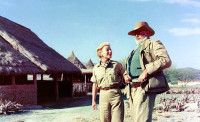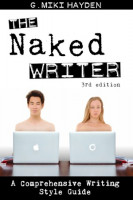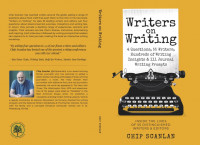
How to write like Ernest Hemingway
bigthink.com – Wednesday January 19, 2022

Today, more than 60 years after his death, Ernest Hemingway is known not just for his moving stories but his technical writing skills. According to E.J. Gleason, professor of Irish and American literature at Saint Anselm College in New Hampshire, Hemingway had found his artistic voice before he turned 26. His signature writing style, characterized by short phrases constructed using plain, everyday English, left a profound impact on the literary world, shaping generations of aspiring fiction and non-fiction writers that followed in his footsteps.
Although Hemingway’s way of writing may seem straightforward, it is by no means simplistic, let alone easy to imitate. A less talented writer might hide their lack of substance behind difficult words and convoluted sentences, but to write like Hemingway requires both a great effort and real intellect. Like a surgeon, Hemingway stripped his stories of any and all insignificant or superfluous information, until only a basic skeleton and a handful of vital organs were left on the page.

Do writers need Twitter to be successful?
irishtimes.com – Tuesday January 18, 2022

Twitter terrifies me. Somehow, I’ve equated my lack of popularity on this admired social media platform with my writing ability. Every tweet is posted with a racing pulse and a flood of underarm sweat. Often to be deleted moments later. But I’m told Twitter is the way forward for emerging writers.
On Twitter, everyone wins prizes and gets published. I leave every scrolling session more deflated than I started. Why does it invoke the worst in me? The jealousy, insecurity, the unhealthy comparisons with other writers. Do I need to put myself through this? I figured it was time to go back to my journalistic roots and attempt some nonfiction. It can’t be any worse than my prose.
When I attended a John Hewitt workshop a few years ago, Twitter was hailed as an excellent resource for writers. I resisted for a while, but the fear of missing out made me cave in and sign up. Initially, scout’s honour, I joined to source writing opportunities. However, when I won a few small competitions, I couldn’t help posting news of my success. That was the Twitter way. But then I was filled with a strange sense of self-loathing.
Finger cramp after writing: What is writer’s cramp? 4 ways to stop it
express.co.uk – Monday January 17, 2022
WRITER'S cramp is the formal name for the pain and cramping in the hand muscles after doing lots of writing or other repetitive movements of the hand. Here's why it happens and how to stop it.
Writer’s cramp affects between seven and 69 per million people of the entire population. It isn’t exclusive to writers, however. This achy hand condition impacts anyone who uses their hands repetitively, such as musicians, chefs, gardeners, someone who uses their phone or laptop too much, and so on. The issue is most common in those aged 30 to 50 and affects men more often than women. Think you’ve got writer’s cramp? Express.co.uk chatted to Dr Deborah Lee from Dr Fox Online Pharmacy to find out everything you need to know about writer’s cramp.

Getting Feedback on Writing: Tricks that Help to Succeed
ventsmagazine.com – Thursday December 23, 2021

You have some audience if you are a writer. It is evident that you will get some feedback to your ideas and style of writing. There are different contexts for that: readers’ reviews, editor’s notes, comments from the peer writers, and others. Are you ready to acknowledge that some feedback is going to be negative?
Essay writers are always vulnerable. They are exposed to criticism, judgmental comments, and subjective opinions. It may happen that people will give harsh comments without any explanations. Getting feedback on writing can hurt, and you have to realize this aspect from the very beginning. If you are not ready to deal with negative remarks, you will not feel confident as a writer. Nevertheless, it can be complicated to get the feedback, it is important for you as a writer.
You cannot get an objective picture of what you do without knowing the opinions of other people. Do you want to make your writing more advanced? Then you can focus your primary attention on the areas mentioned in the review.

The Naked Writer by G. Miki Hayden—in Action
By G. Miki Hayden
Instructor at Writer's Digest University online and private writing coach
firstwriter.com – Wednesday December 22, 2021

No matter how gifted a writer you are today, you can become a much better writer than you are now. I know you can because I, myself, have transformed into a greatly improved writer over the years. Recently, I’ve been re-editing a lot of my work from the 1990s, to the mid-2010s; and looking at even more contemporary work of mine to just this year, I see how I’ve grown.

How to Start Writing Fan Fiction
bookriot.com – Wednesday December 15, 2021

I began writing fan fiction in around 2008, when I was 11 years old. So, since I’m 24 now, that’s more than half of my life ago! It was then that I loved Twilight and a few other fantasy novels so much that I was desperate to find more stories in that universe and Google searched for that exact thing. And to my surprise, there were tons of them on a magical but now outdated site called “Fan Fiction Dot Net.”
Through middle and high school, I wrote fanfic for a ton of different fandoms but mainly The Avengers. Fan fiction not only helped me practice character development but also come to terms with my queer identity through pairings I enjoyed, especially since I grew up in a fairly conservative area where being queer wasn’t something I could share without losing friends.
These days, I’m a reader of fanfic more so than a writer of it — in part because I have other writing projects that take up more of my time, and a day job, and non-writing hobbies that help me avoid burnout but also take up time, et cetera, et cetera. But I still enjoy reading it for stress relief and a reminder that writing can be purely for joy and personal fulfillment if you want it to be.
Fan fiction became my gateway to writing original stories. I’m adamant that it can play a positive role in practicing things like character development or even just finding a love of writing. These six tips will help you get started writing fan fiction if you’re a beginner and get the most out of your project.

Can “Distraction-Free” Devices Change the Way We Write?
newyorker.com – Monday December 13, 2021

For a long time, I believed that my only hope of becoming a professional writer was to find the perfect tool. A few months into my career as a book critic, I’d already run up against the limits of my productivity, and, like many others before me, I pinned the blame on Microsoft Word. Each time I opened a draft, I seemed to lose my bearings, scrolling from top to bottom and alighting on far-flung sentences at random. I found and replaced, wrote and rewrote; the program made fiddling easy and finishing next to impossible.
I’d fallen into the trap that the philosopher Jacques Derrida identified in an interview from the mid-nineties. “With the computer, everything is rapid and so easy,” he complained. “An interminable revision, an infinite analysis is already on the horizon.” Derrida hadn’t even contended with the sirens of online life, which were driving writer friends to buy disconnected laptops or to quarantine their smartphones in storage bins with timed locks. Zadie Smith touted Freedom, a subscription service that cut off the user’s devices—a chastity belt for procrastinators.

From reporter to the corner office: a self-publisher’s maiden voyage
poynter.org – Monday December 13, 2021

Self-publishing, once derided as ‘vanity publishing’ reserved for losers who couldn’t find a traditional publisher, has gone mainstream.
Four simple questions recently changed my life, and I hope they’ll change yours, too.
As a journalist, freelance magazine writer and author, I’ve been working for publishers for 50 years. They were shadowy figures in suits, sometimes glimpsed in the elevator, but rarely stepping into the newsroom. Often, they were just a name on my paycheck.
Nevertheless, they controlled my life, and the lives of those in the newsroom, and not just through the wages they paid. While leaving editorial decisions to editors, (usually) they ruled over the business side: printing, marketing, promotion, distribution, and all the other work required for the daily miracle of newspapers, monthly deadlines for magazines, and those for books that may stretch for years.
This fall, dissatisfied with the marketing and promotion of my last three books, I decided that it was time for a change. I wanted to control my own publishing destiny.

Michael Pietsch Looks at Publishing’s (Near) Future
publishersweekly.com – Saturday December 11, 2021

The publishing industry had an unexpectedly good year in 2020, despite the many challenges created by the pandemic. In the essay below, Hachette Book Group CEO Michael Pietsch uses lessons from last year to make some educated guesses about where the industry may be heading in the near term.
The essay is part of a larger piece that appears in the Publishers Weekly Book Publishing Almanac 2022: A Master Class in the Art of Bringing Books to Readers. Published last month by Skyhorse Publishing and written in cooperation with PW, the almanac is designed to help authors, editors, agents, publicists, and anyone else working in book publishing understand the changing landscape of the business.

Insider tricks that will help you find a publisher for your book
irishtimes.com – Thursday December 9, 2021

Lockdown offered many frustrated writers a key to unbolt the constraints of daily routine and an opportunity to work on the novel or work of nonfiction that has been gathering dust in their minds or in a bottom drawer for years. If 2022 is the year to take your book to the next stage, we asked authors and publishing professionals for their advice on how to make that happen.
Get the free newsletter | Submit a news item or article | Get Writers' News for your website





